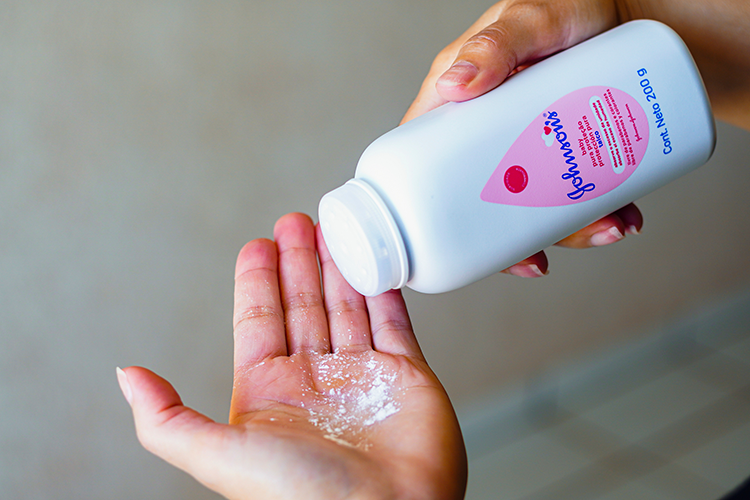Johnson & Johnson sets up third talc bankruptcy bid by moving unit to Texas

Johnson & Johnson is facing tens of thousands of lawsuits alleging that traces of asbestos could be found in its baby powder and other products, causing ovarian cancer and mesothelioma. (Photo by Rafael Henrique/SOPA Images/Sipa USA via the Associated Press)
Johnson & Johnson is seeking to move a unit to Texas as it prepares for a potential third bankruptcy court filing to resolve more than 50,000 lawsuits alleging tainted talc in its baby powder caused cancer.
The company filed a request last month with the Texas secretary of state’s office to relocate its LTL Management unit to Austin and rename it ahead of a Chapter 11 filing in the state, according to the Dec. 19 filing and people familiar with the plan.
J&J has put the LTL subsidiary into Chapter 11 twice before in hopes of imposing a $9 billion settlement on former users of the product. Both cases, filed in J&J’s home state of New Jersey, were thrown out. The decade-long litigation, plus the prospect of potential future cancer suits, is limiting its stock price, analysts have said.
J&J, based in New Brunswick, wouldn’t say where the bankruptcy case would be filed or comment on the timing, but has said it is working hard toward a resolution of its current and future talc cases.
“Consistent with the plan we outlined last year following the New Jersey bankruptcy court’s dismissal of the case,” the company “continues to pursue several paths to achieve a comprehensive resolution of the talc litigation,” Erik Haas, its in-house lawyer overseeing the cases, said in a statement. He said that includes a new bankruptcy filing, as “strongly recommended” by the court.
‘Texas two-step’
Texas law lets companies assign liability from mass tort cases to a unit that can file for bankruptcy. The maneuver, known as the Texas Two-Step, has drawn criticism from some legal experts for allowing solvent companies to use bankruptcy court to force settlements on claimants.
More broadly, J&J has been grappling with opposition to a bankruptcy filing anywhere. Chapter 11 rules let corporations put money into trusts that decide how much claimants should be paid, instead of allowing juries to decide damages. Many J&J claimants have vocally opposed relying on a trust to decide compensation.
In July, a judge in New Jersey rejected J&J’s second bankruptcy attempt, in which the company sought to get claimants’ backing for its $9 billion settlement offer. The judge said J&J didn’t meet the test for financial distress. An appeals court threw out the first case on the same grounds.
Some legal experts said they expect a third J&J bankruptcy case to go the way of the other two. Melissa Jacoby, a University of North Carolina law professor and bankruptcy expert, said the chances of a new talc Chapter 11 case succeeding “should be zero.”
But that won’t stop J&J from trying, she said.
‘Pursuit of accountability’
If it succeeds, “the profitable parent company will get financial and legal benefits out of a third LTL bankruptcy case as it stalls,” Jacoby said in an emailed statement. “Pursuit of accountability outside of bankruptcy will be halted.”
In the meantime, she added, more claimants may succumb to their illnesses.
Once a company files for Chapter 11, judges can halt all litigation against it while the bankruptcy case proceeds. J&J faces a spate of jury trials this year over claims it knew for more than 50 years that talc in its baby powder could cause cancer and continued to sell it.
Since 2014, at least a dozen juries have awarded a total of more than $6.5 billion in damages to consumers blaming the powder for their cancers, according to data compiled by Bloomberg News. Some of those awards later were reduced or thrown out on appeal.
J&J maintains that its talc-based products don’t cause cancer and that it has marketed its baby powder appropriately for more than a century. The company has won a number of cases in court and had other suits dismissed before trial.
J&J pulled its talc-based powders off the market in the U.S. and Canada in 2020, citing slipping sales, and replaced talcum with a cornstarch-based version. J&J vowed to remove all its baby powders containing talcum powder worldwide by the end of last year.
The consolidated case is In Re Johnson & Johnson Talcum Powder Products Marketing, Sales Practices and Products Liability Litigation, 16-md-2738, U.S. District Court, District of New Jersey (Trenton).



